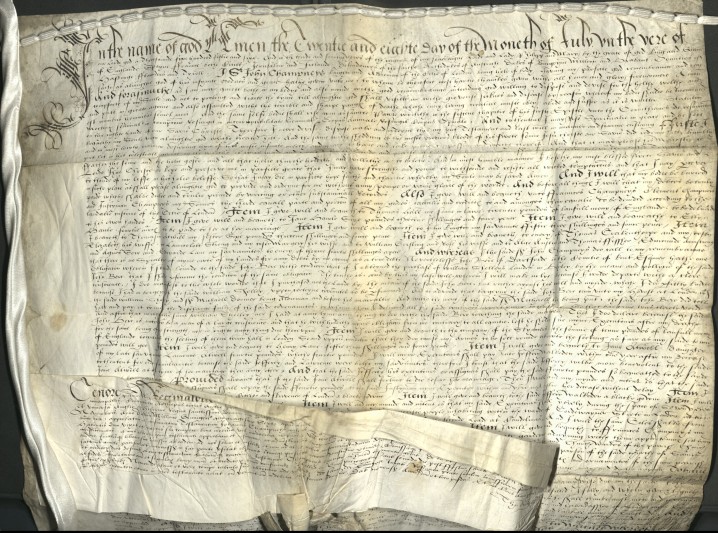Oliver Wooller, Community Archivist, writes: John Champneys was born around 1490, the son of Robert Champneys of Chew Magna in Somerset. He came to London to study at the Inns of Court and in 1514 obtained the Freedom of the City of London by joining the Skinners’ Company. He then became in effect a merchant adventurer importing commodities like oil, wine, iron and alum and on one occasion sable skins. Much of his success was due to his marriage to Margaret, the eldest daughter and co-heir of Sir Thomas Mirfine and widow of Roger Hale, a wealthy citizen and grocer, who died sometime before 1515. After Margaret Champneys’ death John married Meriel Barratt, daughter of John Barratt of Belhouse in Essex. She died in 1534.
Thanks to his success in business and these family connections John was able to achieve high office in the government of the City. He served as High Sheriff of London in 1522-1523, Master of the Skinners Company for six years between 1527 and 1539, and an Alderman 1527-1556. In 1534 he was elected Lord Mayor of London and was knighted by Henry VIII.
In 1537 Sir John obtained a 99-year lease of the manor of Bexley from Thomas Cranmer, Archbishop of Canterbury. At the same time, he bought the freehold estate in Bexley of the former tenant, William Shelley, and in 1540 began building Hall Place on the site of an older house erected by the Shelley family in the previous century. Sir John Champneys died of plague on 3 October 1556 and was buried in St Mary’s Church, Bexley, with considerable pomp and at vast expense.
In his will dated 28 July and proved 12 November 1556, he divided his goods and chattels equally between his three surviving sons, Francis, Clement and Justinian, according to the customs of London. In addition, his eldest son, Francis was bequeathed two leasehold tenements with a large garden in the Parish of St Olav near the Tower of London, but Hall Place and the Bexley estate were left to his youngest son, Justinian in accordance with the Kentish custom of gavelkind. The pious phraseology of the will written in the reign of Queen Mary suggests that Sir John had been Catholic in his sympathies. However, his request for a modest burial without vainglory was ignored by his heirs. The will contains a curious warning that John Beer of Dartford, being a man of little conscience, might claim payment of the bond given to him some twenty years earlier although he had no right to do so. Beer had been asked to use his good offices to secure the purchase of the Hall Place estate, but in the event his services were not required.
